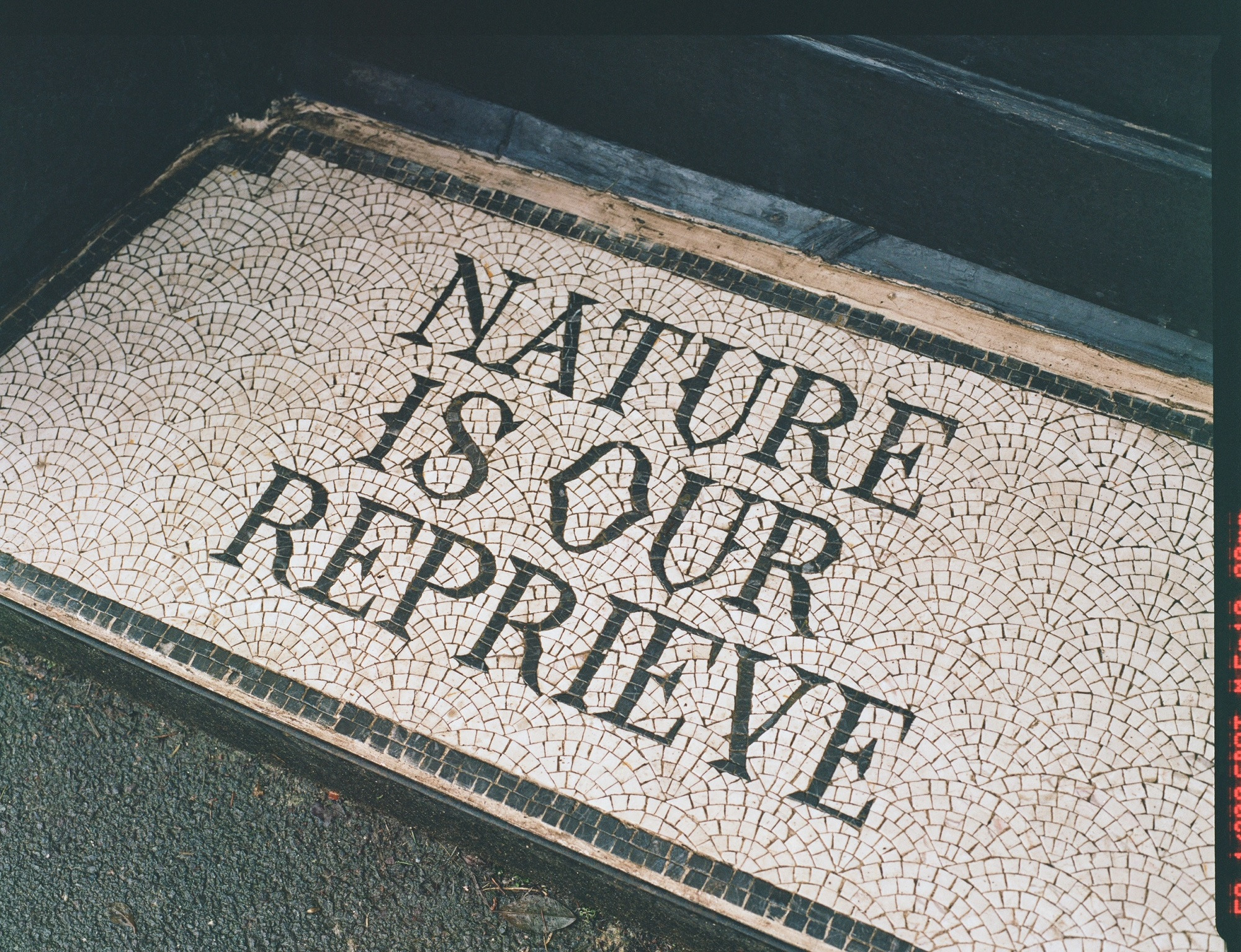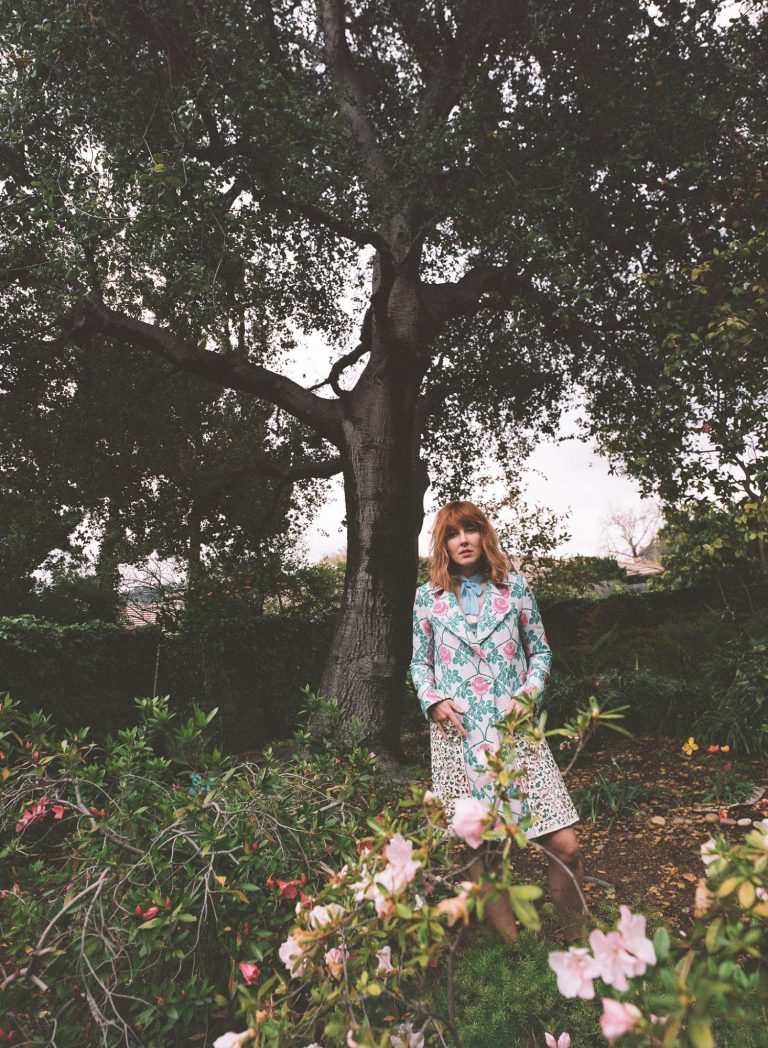
The Mother Lovers
Published: 2023/11/13
Updated: 2023/11/13
- Interview
- Rebecca Dayan
REBECCA DAYAN: I'll just ask you, how did this all start?
PAULA GOLDSTEIN: That's a good question. After the birth of my first child, Luna. I didn't find out I was pregnant until eight weeks and I was like, oh shit, what do I do? I went through the American healthcare system without any real understanding – I got an OB GYN, because apparently that's what you do in the United States. I went through the whole system with her. Then at 33 weeks pregnant, [my OB GYN] was like, ‘I think we should induce, because I'm away on vacation on your due date.’ I freaked out. I said to you, to my husband, “I'm never coming back to that hospital again.” So, I switched to midwifery care very late in my pregnancy. I was in LA, which means we did have midwives. There was a lot of privilege involved in that – I had to pay out of pocket. Anyway, long story short, I had a great birth. It was super easy. I had literally had two cups of tea and went home.
At the same time, I had a friend who had less privilege, who didn't have options. She was on Medicare, was also induced, ended up having an emergency C-section and almost died. Sitting there with a newborn, I started looking into this and thinking about it. For most new mothers, you go into this weird state of existential crisis, I think. You assess your life on earth and what's happening and what just happened to you. And I was like, ‘why did that happen to me? Was it luck? Was it because I'm European and I have a different understanding of birth? Was it because I had the financial means to be able to make choices?’ And that's when I found statistics about birth in the United States, and I couldn't stop obsessing over it. I was driving my husband insane, and he was like, ‘you know what? Just make a fucking movie’. [laughs]. So that's what happened.
Pretty soon after that you and I had drinks at Soho House. Describe to me why you care about this issue? Because you know, on the surface you're like…
I'm not a mother [laughs].
Yeah, exactly. You're not a mother and you're a chic, French actress. People might be like, what?
I started becoming interested in birth in general just after my mid-twenties when I watched [2008 documentary] 'The Business of Being Born', about 10 years ago. I was just shocked at the statistics and the way the American healthcare system is treating birth. I was obsessed with the idea of less intervention and less medication and natural births. At the time, my cousin was living in Miami without health insurance. She had to give birth at home with a midwife and a doula because she didn't have health insurance, and she just couldn't afford to give birth at a hospital. Throughout all those years, up until we had that conversation, after you had Luna, I kept educating myself about those subjects.
I was really monomaniac about it and my friends were kind of like, ‘why are you talking about this? Uh, we don't care.’ I think what shocked [me was], I didn't realise the urgency. I knew the system was fucked up. But I didn't know when we had that conversation what you were telling me – that mothers are dying of childbirth-related causes. I did not know that. That's the thing that made me feel that we needed to make a documentary and embark on this crazy journey.
If we talk about the process of making the film – firstly, my film background is very minimal. You at least come from the industry. But I came from fashion and my film experience ran to like, making a four-minute Armani film before this [laughs]. But I think that lack of knowledge and expectation really helped me in making a film. Plus, the fact that I made it with people like yourself, and brands and people kind of just came in very naturally. The team behind the film is all female, which I picked firstly because I wanted there to be a comfort level within people speaking in the documentary. I wanted them to feel safe to tell their stories in front of a female sound person and a female camera person and cinematographer.
I think there's also part of me that felt like I would be more allowed to tell my story if I didn't have some bro who's like, ‘I've been editing films for years and this is my artistic sensibility and this is what I need to do.’ I think in that sense the filmmaking process became hugely collaborative. Like Steph who started out as an editor then became a co-writer with me. We had you come in and give your opinions. I think even with the music, everyone fed in, and I think the story feels very natural in a way. I don't necessarily think it's a single-vision documentary because it's a film that came with a mission.
The mission is to educate, you know. I never made this film to become a festival, award-winning film. I made this film to get it in front of as many people as possible. And I think the people involved in the film and the stories they share informed the filmmaking in a way that I didn't truly understand. Someone said to me just before I made this, ‘you won't know the kind of documentary you're making until you finish your last shot’. Which I didn't understand at the time, but now, it feels special. I feel lucky that we've had the time and honestly even Covid, which was such a stress for us and made us put everything on hold, I think helped. It gave us some clarity and vision and the world and the landscape in the US has since changed dramatically.
Do you think it's better – I mean obviously it's fundamentally worse for women in the United States – but do you think there's more interest in storytelling around women's stories now?
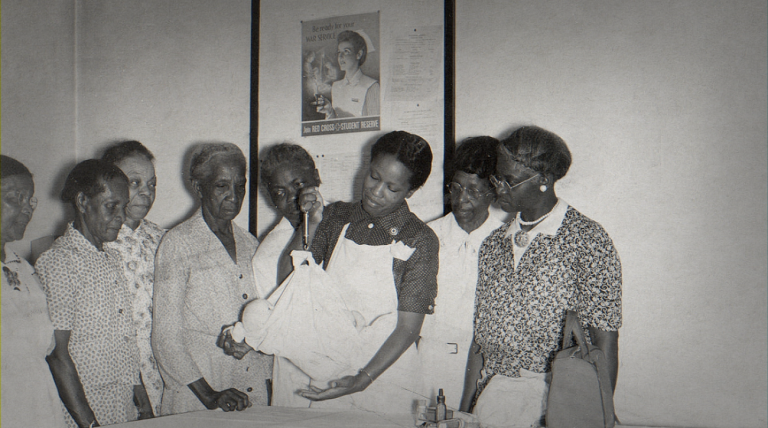
Still from Born Free.
I feel like, yeah, in one sense there is. I mean it's not better for women in general. The situation is pretty dire, as we know, with everything that's happened with Roe v Wade. But there are a lot of people talking about these subjects and a lot of people talking about healthcare – not just maternal care. But maternal care is taking the forefront in the news. So that's good.
I think at least there is hope. The situation is not better than when we started, but there is hope that potentially, we – by which I mean everyone – are going to be able to start implementing change in the future.
You mean you and I aren't gonna save the world on our own? I thought that was our entire ambition. I do think having said that, yes, we're not completely gonna change the world on our own, but there are a lot more people who are receptive to changing the world with us now than when we started.
Women have been pushed so far into a corner on health that they've come out to help in all sorts of ways, from even the brands that have aligned behind us. It's not necessarily true that those women [working for corporates] didn't care before, I think it's just more that now there's actually space for them within their companies to say, ‘this is really bad, and we can't keep ignoring the state of women's health’, particularly in the United States. I don't know about France, but the UK for example, is also having huge issues with healthcare in general because of underinvestment, particularly in midwifery.
So as much as this is an American issue, it's a global issue as well. As a Brit, I wanna shake everyone who lives in countries with healthcare and just be like, ‘you don't fucking understand. You have to protect healthcare at all costs. I think that side of things, coming from a European perspective is interesting. The landscape doctors and midwives are operating in at this point in the United States is very different. There's been a huge increase in home births for example. I think as more people become more educated, both to protect themselves like your cousin, or for purely financial reasons, and since Covid, I think it's become more normalised to think of care in a different way.
And that part of the conversation is interesting for me in the United States. The abortion debate is just, I mean it's a health care, I always explain to people, especially Brits, who complain about the US – I'm like, yeah, but the US is a teenager country. There are these two teenager sides that scream at each other and fight and it's really loud and chaotic, but at least shit changes. And in the UK, and I don't know if France is the same, but it's like an old grandfather country and it takes a hundred years for anything to change. For me, yes, it's dire on one level for American women right now. But then on the flipside, there's been so much pushback even from places considered very conservative or very red.
I think women across the spectrum are now reassessing their value in society and what it means to be a woman and taking more proactive approaches. I think the loudness on the other side in response to the abortion bans has been a good thing. It's been productive in that we're no longer just sleepwalking into all this shit that's happening to us. At least it's happened in a moment where we have social media, and we can be organized, and we can rally people together.
I guess also that feeds into what we are doing within the nonprofit and Mother Lover. I don't think you and I would've necessarily known how to start a nonprofit or what to do with it prior to the time we're in now. Ten years ago, if anyone was like, ‘oh, you could start a maternal health nonprofit, and it could actually get on its way to being successful and facilitating change, and you could connect to stakeholders all over America,’ I'd be like, ‘Yeah, cool. No’ [laughs].
Has it been interesting to push yourself outside of your comfort zone?
There were so many parts to making all of this. First, there was, okay, let's do a documentary. And then we were like, well we need to raise money to make the documentary so, let's start a nonprofit and all these things we're kind of all these learning experiences that I think, both you and I really grew from. We met a lot of people that really championed us and helped along the way. That overall was a positive experience, even though we were navigating something that was a little bit scary and felt a little bit hopeless at times, just because of the subject. It was really enlightening, and it was such a joy also to just meet all these collaborators and people willing to help us make this and make this the best possible. To this day people are still super supportive and you know, it's an ongoing thing.
Personally, it came at a time where I was feeling frustrated with my own career and it was selfishly enriching to be focusing on something that ultimately has a goal that is bigger than myself.
It was a fun process. We’re at the beginning of seeing how the film is received now that we've had two pretty successful screenings. A smaller one in New York, a crowd of our peers I would say. Then a bigger one in LA that involved way more of the birth community. Both, I think were a success. How did you feel after that?
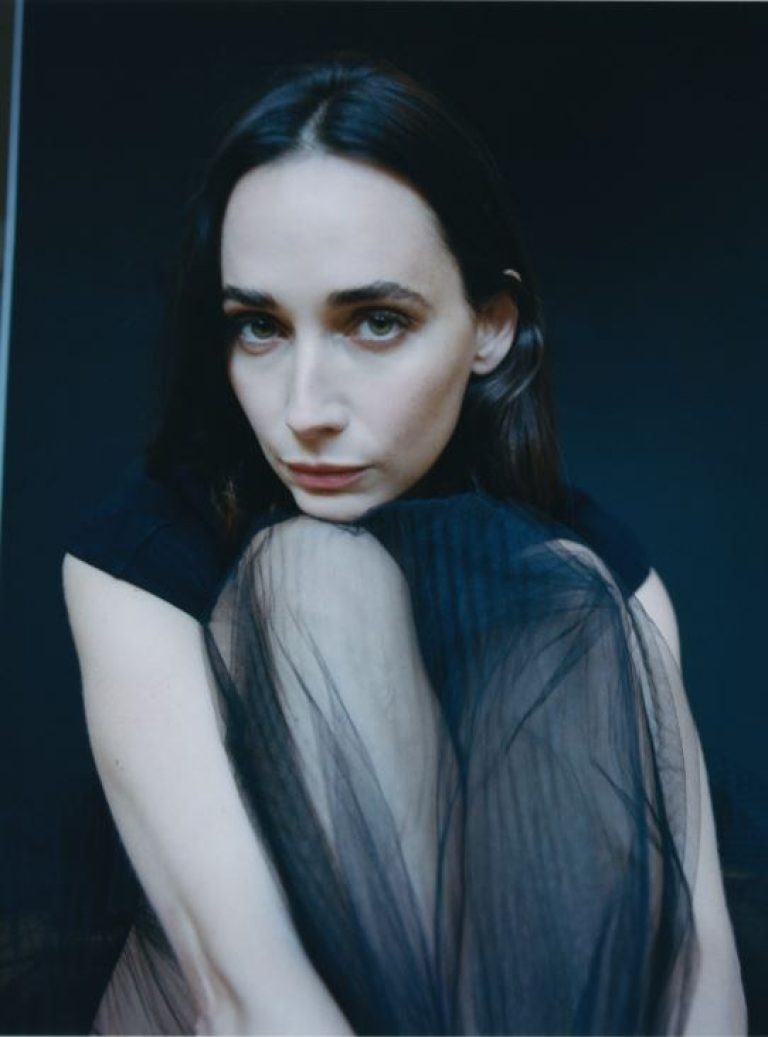
Rebecca wears dress by CHANEL.
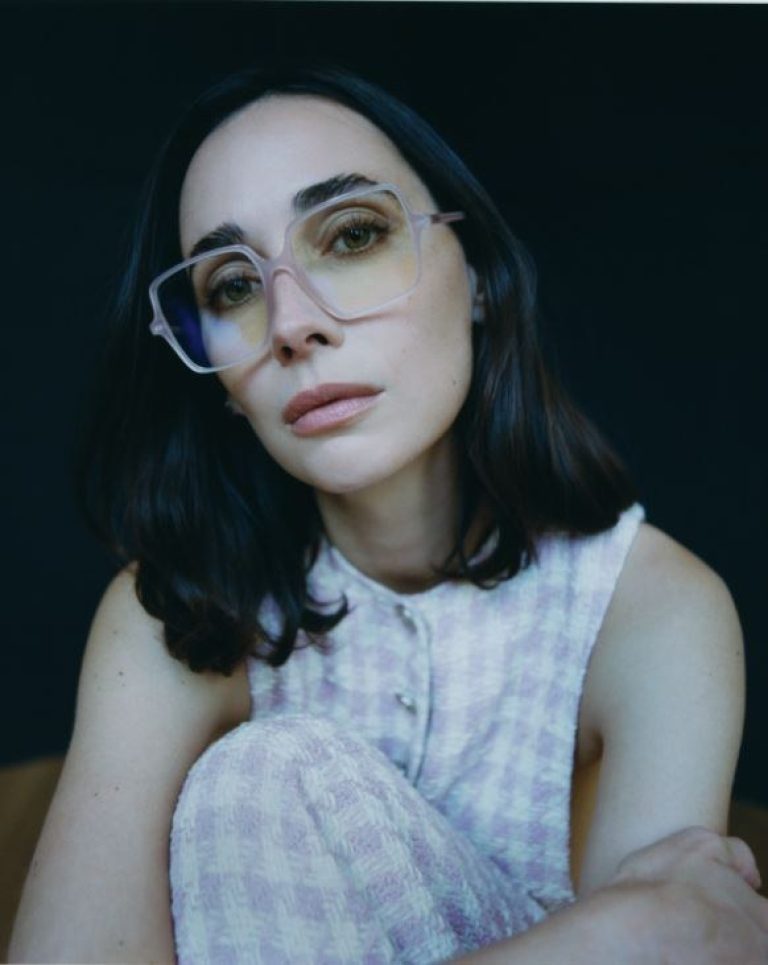
Dress by CHANEL.
Firstly, it's always terrifying to put something you created out in the world as any creator, but also the fact that this was bigger than us and the whole point was to start a conversation. With most films, you make the film, and the film is the end result. Whereas 'Born Free' is intended to ask questions, and the nonprofit is to help fund, find and educate on answers. So that part to me was important – that people connected to the film in a bigger way than just like, ‘oh, that was cool’. I think people have connected to it. People have told us they loved it, and that they've been moved. I think there are certain groups for which this film isn't easy to deal with – like Charles, who's in the film and was at the screening in LA. I think having to relive his grief over and over is really fucking hard, you know? But he also feels proud of the film, and we are continuing to collaborate and make change. There's something special and joyful in that.
I hope the film kind comes out with a sense of joy and hope, as hard as it is. I didn't wanna focus the whole film on people's losses and pain. Especially given that there are specific communities that suffer more. I think it can feel a bit wrong just to focus on kind of rehashing that pain again and again. That's why I made the film in the way I did because I was really wanting to focus on solutions. And people are now coming to us with solutions. Birth workers are reaching out, nurses’ unions, people who can become part of the change.
And then also brands and friends. It's been interesting, like you said, the New York audience was peers, but people from that screening have contacted me and said, ‘I saw the film and my friends saw your film in New York too and they said it's really important that we connect, and we do stuff [about this issue].’ It's a really special experience to start showing the film because people are reaching out. It's doing what it is supposed to do – to start a conversation.
A lot of my friends came to the screening in New York and came out a little bit terrified. That is also the goal, for people to feel a sense of urgency. On a smaller scale, what I find the most rewarding is, a friend is having a baby. And after [watching the documentary], she was like,’ I have so many questions that I'm gonna ask my doctor, and I'm getting a doula.’
So even on a one-person level, seeing the effect that it has on people, just people being like, ‘huh, I never thought about it. I had no idea of any of this and now I know what questions I need to ask my doctor.’ That felt very rewarding.
And that's why we made a film, so we can help one person at a time. Someone came up to me after the screening in New York. She's in her sixties and she was like, ‘I had a really traumatic birth and I've never been able to tell anyone about it.’ I think even having those conversations with our own mothers is important. It's important for people who are going to have children. It's also important for people who maybe have trauma from having children to make a safe space to talk about that.
Yes. And to add something else also about the film. A lot of other people who came and watched the film complimented it as a very well-produced documentary. That's something that we can also be proud of – not only it is impactful for the stories and the questions it raises, but I'm also very proud of the film itself as a film.
I agree. I think we attempted to make it in a way that wasn't your average documentary. I had this idea of kind of putting in strange things and really playing with the music and becoming a crazy person and trying to license music from across America and making us bug everyone we knew who had a friend who was vaguely connected to a record label [laughs] so we could get it. In the end that stuff paid off because that is what carries the film, that it has a sense of creativity and storytelling that isn't necessarily in your average flat, educational documentary. I'm proud of it in that sense.
So, we were gonna also discuss personal experiences with women's health…my parents were like pretty open with me as a kid in England. I went on the pill super early. I always feel like I was pretty in control of my own destiny when it came to like reproductive health, but I know that's not a normal story.
People in America think I'm insane, [because] I don't go to the doctor, like barely ever. Touch wood. But I do think that there's a level of privilege in that we've both have pretty open relationships with our families, where we talk about things if we have issues. At least in the UK, accessing birth control is super normal. In the United States it becomes a lot more layered and complicated – partly because of capitalism and people just wanting to make loads of money out of you. But then that other whole layer of like, ‘getting contraception is not good for the family’ [laughs] or some weird shit. I think there's layers of strange religion in the United States, which isn't really religion but it's like these connotations which they've used to try and control people's bodies, to make normal things feel shameful. I think having a daughter now is also like a weird question of when do you talk about certain things, what do you say, and how do you make things feel normalized, with the kind of questions kids have?
Women's health is important to me because she's starting life in a world where women have less rights than we did growing up, yet at the same time in a world where I hope that we can have more direct conversations and feel more open and secure in our bodies. I would say the one thing that I did grow up with is a sense of shame around women's bodies. Having all these hangups and having weird issues – not wanting to talk about my periods. I think that is still there and present, even if I had very good, positive experiences in the healthcare system. And I would say the reason I have had very good positive experiences in the healthcare system is because I've barely been in the healthcare system [laughs].
Same. I mean same, honestly.
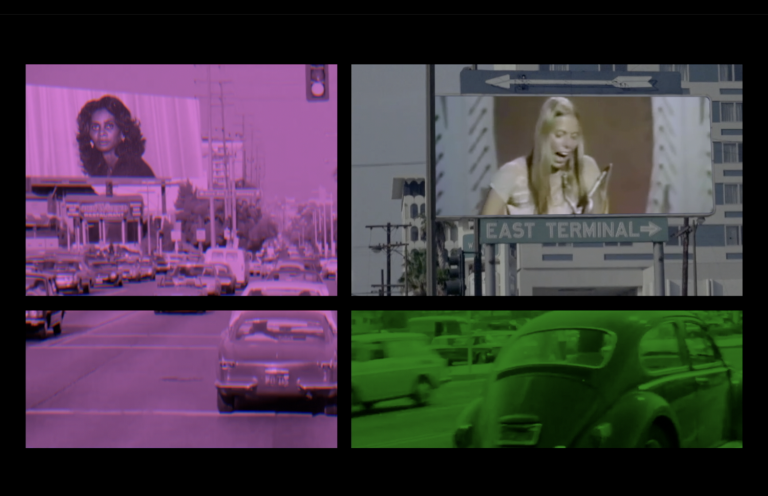
Still from Born Free.
I think unfortunately the more you exist in these systems, the more likely you are to have a bad experience where you are dismissed and not heard. If we talk about the wider issues of 'Born Free', there's also the dismissing of women's voices, there's a dismissing of Black women's voices at a whole other level. But also, the system is failing right now. There are not enough doctors, in the United States we do not have an enough OB-GYN doctors. It's on the verge of collapse and something has to change.
The lack of safety net in the healthcare system, for nurses – there's a nurses’ strike in the UK this week, and nurses are quitting at record rates in the United States. People are not wanting to train in the medical system anymore because of how tough it is. I think all this is a systemic failing and I don't know how we are gonna change that, but I think we need to start having those conversations. And if you talk about capitalism, there's so much movement in fem tech, and technology coming into that [women’s reproductive health] space. And so, in a capitalist country like the United States, I guess it's an opportunity, but we've gotta make sure the right people are at the table when discussing those opportunities.
I've been talking to a lot of people about it and I don't think there's an easy fix to these issues. I, if anyone asks me what the simplest answer is in United States, I would say midwives, but getting midwives licensed and normalised is not a simple answer. I think we need to completely change both on a legislative level but also at hospital level and a consumer level. You have to make people think midwives are normal and not just like weird hippie witches who kind of like wave sage around the room.
Make people feel safe, [realise midwives are] medically trained professionals. We also need to change the conversation about birth, and make people not necessarily fear it, but understand that yes, sometimes it can go wrong, but there are all these ways in which we can help ourselves have it go right – or at least feel safe and supported if our plans have to change. I think the midwifery model of care really gives space for that because you see people much more, and in terms of like just solving the postpartum part of this. In the U.S. the biggest killer is suicide unfortunately in terms of maternal health. In the United States you only see your OB at six weeks, and that's it. One check at six weeks and they ask you to tick some boxes on a form like, ‘am I gonna harm my child? Am I feeling depressed?’ And most women won't say ‘yes’ in those boxes, because then you think they'll think you're a crazy person and take your child away, which makes sense.
But then these women are suffering in silence. If you had a midwifery model of care where there's someone you trust and you've seen through your whole pregnancy and they check on you every single week, that's where we're gonna kind of catch a lot of the holes. So, I guess midwives for everyone, but how do we do that? It's gonna be like a state level, it's a federal level, its training, it's investment, it's kind of maybe creating like a giant midwifery company. I think that's the solution, but how we get there, I have no idea.
If consumers are asking for midwives, perhaps there will finally be funding for scholarships for midwives. Perhaps there will be more midwifery schools. Perhaps insurance companies will have to start paying for midwives, which is one of the huge barriers to accessing one. I think every corporate company right now who is trying to offer perks for their employees and saying they have diversity and inclusion practices within their company should offer to cover midwifery and doula care for all birthing people who work for them. Because that's the way in which we force the insurance companies to cover midwifery – when the big corporations who pay the insurance companies start asking for it to be covered.
And then I think it trickles down, because then you can have midwives who are trained and say half their clients are paid for at a high level by major insurance companies and then the other half, are Medicare patients. I think that should be a model that's mixed, but we also need to make sure that midwives can afford to live, you know, and no one's gonna go into the profession if there's not enough money for them to make a living wage.
Basically, we just need to get venture capital corporations, state, and federal government [on board], make a cultural change, and then we fixed it.
[laughs]. Yes. Just easy, you know.
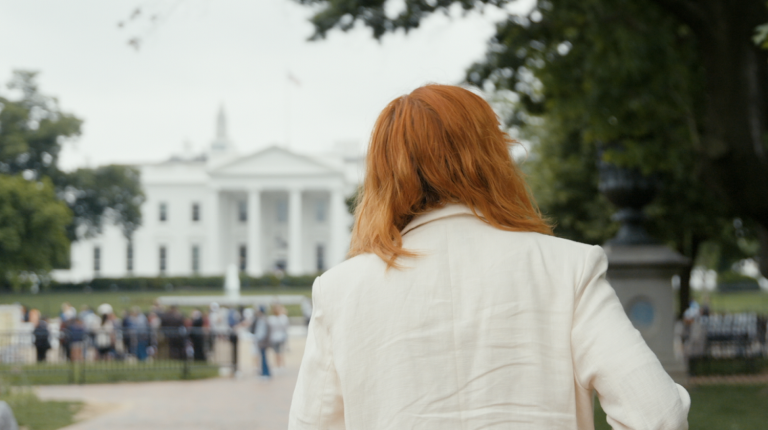
Still from Born Free.
FOR REBECCA DAYAN: HAIR AND MAKE-UP: INGEBORG AT CALL MY AGENT, USING CHANEL.
ASSISTANT: MARQUIS GREGORY. SPECIAL THANKS: RINAT ARUH.
Related Articles

Liberty 150 x150 curated by Leith Clark: The Founder Interviews

Liberty 150 x150 curated by Leith Clark: The Founder Interviews

Liberty 150 x150 curated by Leith Clark: The Founder Interviews

Liberty 150 x150 curated by Leith Clark: The Founder Interviews
